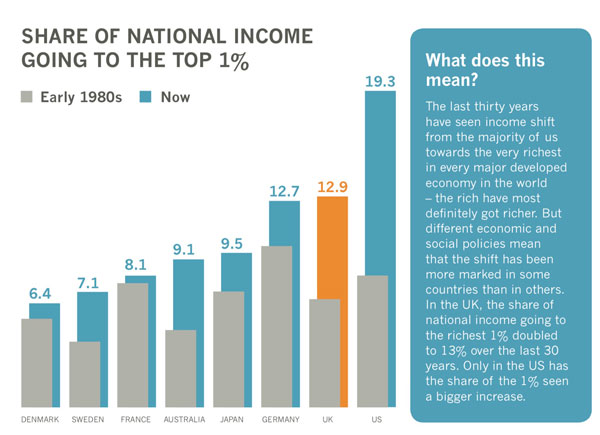
May 13, 2019; The Guardian
“The deepening economic and social divides have led some to question whether inequality will lead to a crisis of capitalism,” said a report commissioned by the Institute for Fiscal Studies in Britain. “With support for populist candidates rising on both sides of the Atlantic, and on both sides of the political spectrum, some question whether inequality may pose a threat not just to capitalism but also to our democratic system.”
Nobel Prize-winning economist Sir Angus Deaton, who is spearheading a thorough review of inequality in the United Kingdom (UK), has sounded the warning that the UK may be following the United States’ lead in the creation of extreme inequality.
“There’s a real question about whether democratic capitalism is working, when it’s only working for part of the population,” he told Richard Partington of the Guardian. “There are things where Britain is still doing a lot better [than the US]. What we have to do is to make sure the UK is inoculated from some of the horrors that have happened in the US.”
Sign up for our free newsletters
Subscribe to NPQ's newsletters to have our top stories delivered directly to your inbox.
By signing up, you agree to our privacy policy and terms of use, and to receive messages from NPQ and our partners.
And, indeed, the Guardian cites some of the same dynamics at work:
His warning comes as analysis from the Trades Union Congress (TUC) showed that real wages in the finance sector had outstripped average salaries in the UK over the decade since the financial crisis. Earnings after inflation in the finance sector have grown by as much as £120 a week on average, compared with the average British worker still being about £17 a week worse off after taking account of rising living costs over the past decade.
Average chief executive pay at the Financial Times Stock Exchange (FTSE) 100 firms has risen to 145 times that of the average worker, from 47 times as recently as 1998, while incomes of the lowest-earning working households have barely risen since the mid-1990s. As in the US, what have been labeled “deaths of despair” are on the rise, particularly among men.
Deaton won the Nobel prize for his charting of global developments in health, wellbeing, and inequality in 2015.—Ruth McCambridge












